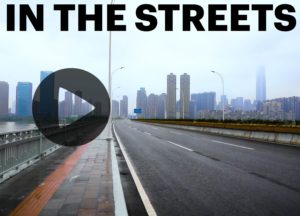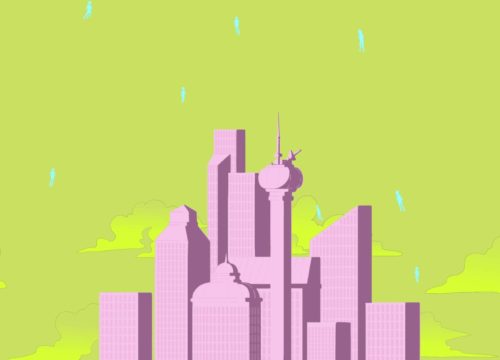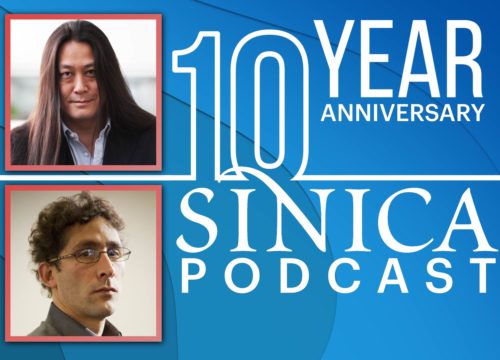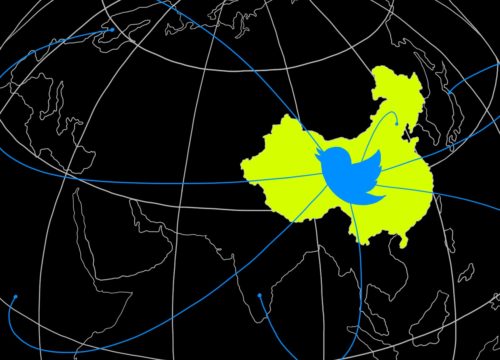James Millward on China’s Repression of Uyghurs in Xinjiang
We interviewed Georgetown University Professor James Millward at the NEXT China 2019 Conference in New York City on November 21, 2019 for his thoughts on the Uyghur Crisis in Xinjiang.
We interviewed Georgetown University Professor James Millward at the NEXT China 2019 Conference in New York City on November 21, 2019 for his thoughts on the Uyghur Crisis in Xinjiang. Here is our post-event recap.
UPDATE, 1/15/20: For an update of the current situation in Xinjiang, please see:
Mass detentions, surveillance, and ethnic repression in China’s far west: the situation right now
Here’s the full transcript of the above interview:
James Millward: It does looks like (Chinese president) Xí Jìnpíng 习近平 has set out to try to resolve this problem of separatism among the Uyghurs for once and for all, and — at least as it’s articulated as well — it’s also seen as a problem of terrorism. And what’s remarkable about it is that they chose a vast, massive, collective punishment approach to deal with the threat of terrorism.
Now I understand from the point of view of the Chinese Communist Party, all unrest in Xinjiang is instability, it doesn’t fit the model, it’s very worrisome for them, from their point of view. But if you actually look at the kinds of acts which we would recognize as terrorism — that is, with a religious inspiration and targeting random civilians — there aren’t that many.
And another thing that came out of the documents was (that it was) specific three terrorist events in 2014 that seemed to have pushed Xi to adopt a whole new approach, as opposed to a much longer horizon of unrest, even one including the 2009 riots in Urumqi.
This is an important distinction, because if you’re only looking at terrorist acts and extremist thought — as it becomes clear from these documents — then the idea of locking up one and a half million people is absolutely crazy when you have a handful, literally a small handful, of perpetrators of terrorist acts.
If you’re looking more broadly at unrest and instability in the region, but not necessarily expressing itself through terrorism or attacks on civilians, or even necessarily in a religious manner, then you have to really start to look closely at what are the policies in the region that might be leading to such broad dissatisfaction. And unfortunately, it’s that kind of introspection is not happening in the Chinese Communist Party.
What they’re trying to do is eliminate instability, eliminate what they see as separatism, eliminate extremism, but I think there’s a very broad, very large misdiagnosis of the problem going on, and hence they’ve come up with the wrong prescription for how to resolve it.
So the stated goal — and this is stated in internal documents and it’s actually very, very similarly stated in public statements by Xinjiang public officials and even in the foreign ministry, and so on, they’ve said this many, many times — the stated goal is to inoculate people from extremist thinking, or to eliminate a “thought virus” in their minds by locking them up for months and years and subjecting them to indoctrination followed by a kind of coercive labor regime.
I think most reasonable people — and now we even know, officials on the ground in Xinjiang, in Yarkand County and Akto County — they think this is crazy. This is a crazy idea, that you can use these kinds of coercive means and apply them to hundreds of thousands of people to change their thinking.
They’re trapped in their own metaphor, the metaphor of the idea of a “thought virus.” Right? So let’s have an inoculation program, or let’s give people a kind of chemotherapy which will knock out the bad thoughts. The metaphor has taken over policymaking in Xinjiang. And so of course it’s not going to work, and even Chinese Communist Party officials on the ground know that it’s not going to work.
The broad takeaways from the documents include, one, It really lets us know how much these policies are coming from the top, from Xi Jinping himself or from people very close to him.
They also tell us that there isn’t absolute uniformity of opinion about whether they’re a good idea, and that local officials might not approve of them.
They confirm the thinking behind the policies, this idea that there are extremist thoughts that have percolated through the entire Uyghur population that need to be addressed through these kind of extreme means. And in that regard it’s quite interesting because they don’t really differ that much from public statements.
One thing which the documents do show us, which we didn’t really know before, are the cracks in the edifice, the idea that local officials were dragging their feet or were concerned about the economic impacts of the internment camps, and also concerned about potential backlash from those. And the fact that they were leaked themselves, this is really quite a major event, this doesn’t happen very often, and many people have compared this to, for example, the Tiananmen Papers, which was really the last big leak of internal documents with such political impact.
The model of these so-called “educational transformation centers,” “internment camps,” “reeducation camps” — they can also be called “concentration camps” — there’s various roots to this. There’s a certain Confucian transformation idea in there, which of course was amplified and was very much part of the Maoist program of labor reform and thought reform. But of course there was also a Soviet model of thought reform in gulag-type settings, which I think was also part of the system of thought reform and labor camps in the PRC in its earlier decades, between the Cultural Revolution. So it’s a confluence of Soviet and more traditional Chinese approaches there.
The irony right now is, with the camps in Xinjiang, we see something we didn’t see in the Cultural Revolution before, because they’ve singled out people on the basis of ethnicity and religion to apply these means to. And that’s quite different. And in so doing, they’ve put this whole class of people, collectively, in what the theorists of ethnic cleansing and of concentration camps call a state of exception. And this is a state where they are outside of the norms, they don’t need to be treated through the legal system, they don’t need to get the rights and treatment that would be available even to Han in China even in an authoritarian situation. They’re kind of outside all of that and can be treated however the state wants to do it.
And the fact that the state has decided that it can do that to Uyghurs and Kazakhs in Xinjiang is an indication that it’s worrying about them in some of the same ways that, for example, the United States worried about Japanese Americans during World War II, the way in which European states worried about minority populations or Jews or Gypsies or others in Europe, and of course the Nazis as well. These are particular conditions of modern nation-states, when the governments are insecure, when there’s majority-minority tensions, and there’s toxic nationalism, those kinds of things, and this is why it’s appropriate to use the word “concentration camps” for these, because — I don’t think Xi Jinping or anyone in Zhongnanhai said, Let’s create a system of concentration camps in Xinjiang, but they’ve managed to reinvent the wheel for reasons having to do with their perception of the circumstances that are really quite similar to perceptions by states in Europe in the 20th century and in other places, indeed, where concentration camps have emerged.
So the problem of how to deal with human rights violations generally in state-to-state interactions is a difficult one, in particular in U.S.-China relations where there are so many different aspects of that relationship that need to be dealt with at the same time. When you get a situation like this where there are horrific human rights violations, things that are way beyond the pale, that we haven’t seen before, what do you do with a state that’s doing that when you still have to deal with them over things? And indeed, right now, U.S.-China relations have come to a very sorry path. They are more tense and problematic than they have been for a long time. So there are many dangers in that relationship and one’s initial reaction might be, Oh my god, concentration camps, thought reform, this massive rights violations being perpetrated against the Uyghurs, sexual abuse and torture in these prisons, how can you then turn around and deal with them on tariffs, on electronics, or apparel, right? And this is a danger, and it’s a problem really that is more acute now than it has been really at any time, I suppose since the immediate aftermath of the 1989 Tiananmen killings.
So I think one tool that’s been created now, which really wasn’t around in 1989 so much, is this idea of sanctioning individual officials in a very public way. Global Magnitsky sanctions is of course the law from which this comes, and it’s implemented by various organs of the U.S. government, it’s reflected in Congressional acts, and that has the advantage over, for example, massive trade tariffs in that they are targeted, they are specific, they speak to these particular kinds of issues. So I do think that’s a pretty good thing to be doing, it took quite a while to get those sanctions applied, and the Uyghur Human Rights Policy Act, which is the equivalent of the Hong Kong Act that just passed both houses of Congress yesterday, that Uyghur Human Rights Policy Act has still not gone all the way through, so I think that should go through and should be signed by the president.
Some of the entities listed on the most recent version of the U.S. Entity List includes Chinese tech companies that are doing business with Xinjiang authorities, but it also includes local authorities in Xinjiang themselves, the police departments of county level and also the Xinjiang Production and Construction Corps (XPCC), or the Bingtuan, which is very involved in building these camps, very involved in the overall repressive regime in Xinjiang. So I think it’s right to call them out on the Entity List and to sort of keep an eye on what sorts of dealings international corporations are having with Xinjiang authorities, with companies working in Xinjiang, and also, one degree removed, with technology and other kinds of companies that are connected and associated to the system in Xinjiang.
And so far the focus has been on technology. I think one thing that’s going to start happening more — and this is less of a U.S. government action and more that something that’s going to filter up from people at large as more information gets around — is going to be the problem of tainting of supply chains more generally of things coming from Xinjiang, in particular cotton. Also tomato paste. Xinjiang actually grows a tremendous amount of the world’s supply of tomato paste, I think it’s something like 20 percent. China produces 20 to 30 percent of the world’s raw cotton, and Xinjiang produces 80 percent of that, and a large proportion of that is produced by the Xinjiang Production and Construction Corps, which is a state-owned enterprise on steroids.
So this is only recently coming to be better known, but it’s very, very difficult to not just source apparel from Xinjiang, but to source cotton or cotton thread from China generally without being tainted by what’s going on in Xinjiang because so much of the cotton itself that China uses and China sells — for example, to Vietnam to make clothing — so much of that is actually coming from an entity that runs concentration camps, the Xinjiang Production and Construction Corps.
I was recently in a Muji store in Boston, just last week, and they have a rather unfortunate new campaign of Xinjiang cotton shirts that they rolled out last May. And they’re still selling them and they say right on the tag, “Made with Xinjiang cotton.” And I wouldn’t mean to single out Muji because there are plenty of corporations where this is happening. What was interesting about the shirt is that it’s Xinjiang cotton, made in Vietnam, so what that shows is that this is an issue of cotton in broader supply chains that are going into making all sorts of textiles, in other places outside of China, even. And I think when that comes to be better known, I think it will have a big impact — or potentially it could have a big impact — on the textile industry in China generally.





